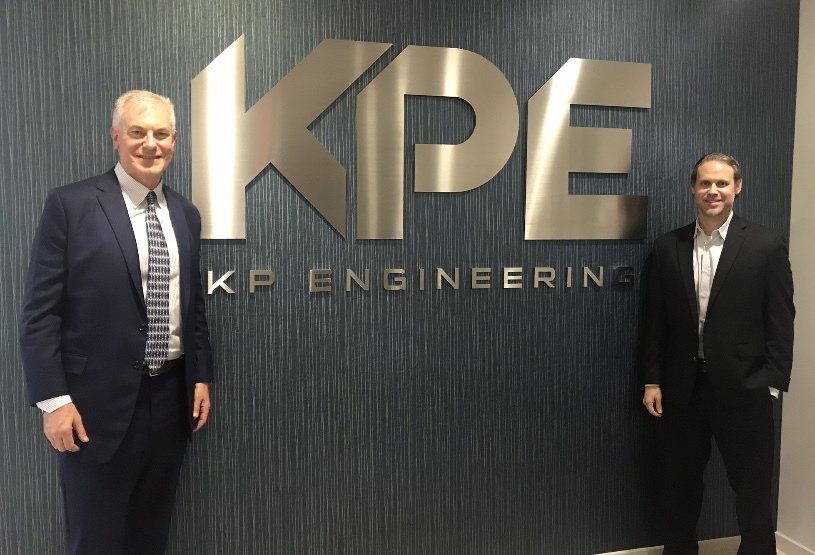- Home
- [Podcast] Hydrogen and Clean Fuels: an EPC's perspective
[Podcast] Hydrogen and Clean Fuels: an EPC's perspective
November 11, 2020
In this podcast, the Editor-in-Chief of Hydrocarbon Processing, Lee Nichols, sits down with our President/COO, Bill Preston to discuss how KPE has leveraged a diverse background in oil refining to adapt to the sustainable market needs of hydrogen and clean fuels.
Pictured on the right are Bill and Lee in the KP Engineering office in Houston, Texas.
Listen to the podcast here (19:38 total):

No access to audio? No problem. You can read key points of the interview below:
[1:36]
Lee: Excellent. Well, let’s jump right into it today on a very important subject, like I mentioned, something that you probably get several I guess e-Newsletters about every day and that’s of course hydrogen. So, my first question is why is the industry so focused on hydrogen today?
Bill: Well, Lee, you know, hydrogen has transitioned from being utilized for oil hydroprocessing and chemical production. Now, it is looked up on more and more as a substitute for carbon as we go to a reduced carbon world and reduced carbon industry.
Lee: All right. So, for my next question, let’s talk about the different colors that we always hear for hydrogen. So, what has caused the need for the transition from gray hydrogen to blue hydrogen and then of course to green hydrogen?
Bill: Good. Well, there’s two sides to this equation. We can talk a lot about the product, hydrogen, what it’s used for a bit. Talking about the different colors of hydrogen is how you actually produce it. This is relatively new nomenclature. Gray hydrogen basically refers to the way hydrogen has always been made. And even within that gray hydrogen, there’s been a carbon reduction as the feedstock over the years has transitioned from coal and oil, say, to now where it’s almost all natural gas based and that is a reduction in carbon footprint. But going now further off of gray hydrogen to what they call blue hydrogen is capturing the CO2 off in production. Easiest to think about steam methane reforming with a furnace stack and you capture the CO2 emission from the stack and that is what's called blue hydrogen. Going on in the green hydrogen is even more where you never generate carbon at all. And typically, when people talk about green hydrogen, they’re talking about electrolysis of water. They actually separate water into hydrogen and oxygen. And they’re never even generating carbon molecule at all and getting your hydrogen that way.
Lee: Okay. And of course, I wanna talk a little bit of course on the technology progression of all of this. Now, how does each variation of hydrogen affect the industry’s technology progression?
Bill: Right. So, going from the current so-called gray into blue, it’s not a huge step. Again, it's using basically the same technologies to produce hydrogen by just recovering the CO2 emission from them that requires I will say generally known technology to get CO2 out of those stack gases. It’s an expense of course, but the biggest problem has been what to do with the CO2 once you have it. It’s very high volume of course. That breaks into two roads. One is what they call sequestration work or geologic capture where you actually put it down in the ground. Another promising route is actually use the CO2 for something beneficial.
One of the classical ones in this part of the country is to use enhanced oil recovery. It’s CO2 injection into oil wells. So, just an example, but there’s other uses of CO2. Going on into green is quite different. The electrolysis of water is something that, you know, just hasn’t been done very much anywhere in the world and especially not in the U.S. So, it is, again, not complex technology. It’s just completely different from the way current hydrogen is made.
Lee: Excellent. So now, with KP Engineering being an EPC firm, I guess how do you approach hydrogen from your standpoint as an EPC firm as opposed to a technology provider?
Bill: Right. So, you know, when you’re in the service industry, which an EPC company is, we do probably look a little bit differently. We work a lot with licensors and one of the— we feel like— core abilities we have is to utilize different licensor packages in our work. But generally, we have to gain expertise at what is being built. It’s not our decision, you know, to build this or not build that. We could make recommendations. But generally speaking, we have to prepare ourselves to have the capability and capacity to build what our customers wanna build.
Lee: And how difficult of a process is that?
Bill: It’s interesting. You know, in some ways, it can be quite jolting. You know, we are company— I’ll be straight with you, Lee— of so-called black oil engineers, people who are very good at refining. But like a lot of industries like this, you find ways to utilize that expertise in a new way rather than you don’t necessarily have to change out the people, you’d probably have to repurpose some of the background they have. We, for example, as I mentioned, are very used to doing hydroprocessing of crude oil. Okay? Now, we need to learn how to hydroprocessing of vegetable oil, and waste oil, and cow fat, and chicken fat, you know. Well, there are some overlaps to those technologies that are very important because some of the technology providers in this green area don’t have the industrial background that we can bring to the party to say this is how you really do that in practice, you know. So, it’s a challenge, but it keeps us on our toes and keeps everybody awake.
[7:59]
Leverage the experts at KP Engineering.